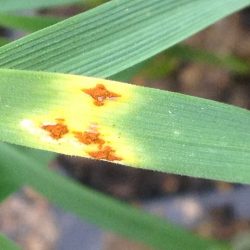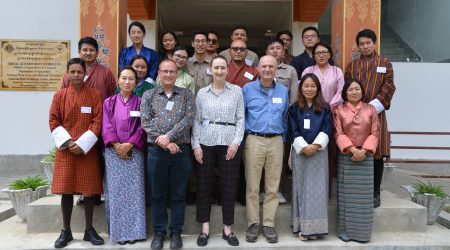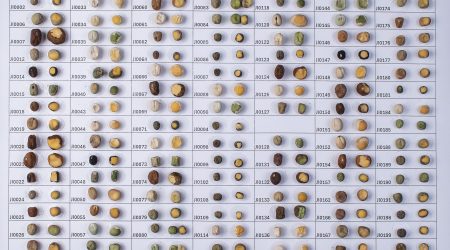The bioinformatic skills inspiring a new age of discovery for South Africa’s plant scientists

John Innes Centre researchers are collaborating with a new generation of bioinformaticians in South Africa. Their urgently needed skills are proving vital in protecting major crops against diseases and in understanding the country’s remarkable biodiversity.
Wilku Meyer, a research scientist specialising in bioinformatics and genomics at South Africa-based company CenGen, spent a month at the John Innes Centre to further his skills as a bioinformatician.
He explains how this, and a series of John Innes Centre-led workshops, have not only helped his own career but helped to inspire a wider interest in bioinformatics and genomics in South Africa.
“In the beginning I never thought I would be a bioinformatician, I just knew I needed bioinformatics to do my project. Now I realise I really enjoy this field,” said Wilku during his month-long visit to the John Innes Centre, at Norwich Research Park.
Before he started his current post at CenGen, Wilku’s background was plant pathology. Like many students with an early interest in science, he wanted to know how things worked.
Genetics, he reasoned, was the best way of addressing this most fundamental of questions, and coming from a farming background, he was drawn to a study area which has applications to agriculture.
This led to an interest in rusts, fungal pathogens which have a major impact on crops in South Africa and one of the research areas of the Dept of Plant Sciences of the University of Free State (UFS).
Wilku’s initial research area at UFS focused on three fungal pathogens that affect wheat: stem, yellow and leaf rust.
Then came a plot twist which sent him off in a fascinating new research direction, he recalls.
“Someone from industry contacted my supervisor and said they had this new strain of leaf rust disease on sunflowers. Previously resistant hybrids were now becoming sick.”
Wilku’s research focus expanded to include the pathology of sunflower, an important commercial crop in South Africa, grown in rotation with maize.
Scientifically, the sunflower leaf rust species he was studying (Puccinia helianthi) were interesting; while they predominantly reproduce asexually, producing offspring that are identical to the parent, they also reproduce sexually on the plant, unlike some rusts that require an alternate host.
This is potentially a threat for growers as the genetic recombination that occurs during sexual reproduction leads to more diverse populations, potentially containing mutations that might evade the plant’s defences, causing disease and crop losses.
These studies produced a memorable moment in Wilku’s scientific career, he recalls, when he observed the sexual stage on glasshouse sunflower plants.
“The asexual rusts are normally brown but as I was preparing to get some images I witnessed a switch over to the sexual stage where you get these yellow structures. This stage is rarely seen, I felt so lucky to see it.”
This observation was the “smoking gun” for the genetic diversity observed in data that indicated that the sexual stage was taking place.
“We could see all the samples of the sexual stage – they were much more diverse from each other, so that explained why we were seeing the diversity in the populations.”
To fully exploit this breakthrough, to analyse rust population structure at a molecular level, Wilku needed bioinformatics, the discipline which is increasingly needed to answer the big biological questions in an age of high-throughput genetic sequencing that produces data on a vast scale.
His first real experience of bioinformatics came in 2019 when his current manager at CenGen, Dr Renée Prins, a John Innes Centre alumna, worked with the British Council to organise a workshop on bioinformatics.
This was followed by three workshops funded by the UK Science and Innovation Network and the British High Commission, South Africa. The aim of this training was to close the knowledge gap in bioinformatics, not only for CenGen, but for universities in the country too.
While a student at UFS, Wilku attended one of these workshops led by John Innes researchers Professor Diane Saunders OBE, group leader, and Dr Burkhard Steuernagel, Informatics Platform manager, as well as Professor Rob Davey from the Earlham Institute.
“The best thing about the course was that they used examples relevant to the research I was doing. The light switch went on for me,” recalls Wilku. “They explained why it was important to learn bioinformatics, but also that everybody has their own individual ways of approaching the problem.”
This course, and subsequent ones hosted by the John Innes Centre team, were instrumental in determining Wilku’s current career path, with him ultimately being employed as a bioinformatician with CenGen.
His PhD thesis, nearing completion, on genetic diversity of fungi in South Africa, will offer new evidence on the diversity of rusts in the country, and compare them with populations in the US and Australia.
Bioinformatics and genomics are part of a burgeoning national interest in “omics”, the field of biological research which uses high-throughput sequencing technology to study biological molecules in nature.
CenGen are leading the way in this, having been part of a collaboration which produced a reference genome for the South African cultivar of wheat. They are now doing the same with barley.
Further initiatives include introducing bioinformatics and genomics in schools to ensure a pipeline of talent for the future.
The company is partner lab in an exciting Government-led three-year infrastructure programme, DIPLOMICS, which aims to sequence the genomes of 1,000 indigenous species to build up a better understanding of biodiversity in South Africa. Plants with medicinal, agricultural and cultural significance are among those being sequenced in the 1KSA initiative.
It’s an exciting time for a bioinformatician.
“If it hadn’t been for that first workshop I would not have been employed as a bioinformatician, got the confidence and skills that have led me to being able to come here to the John Innes Centre and see how things happen at the leading edge,” said Wilku.
“For people starting out I would say keep your mind open for any skills that can be valuable and applied to your project. You never know where this could lead. In my case it has led me down an entirely new career path.”
Dr Burkhard Steuernagel manager of the Informatics Platform at the John Innes Centre said: “It gives me great pleasure to recall Wilku learning those basic bioinformatics concepts at the first workshop we hosted and now see him reporting about his complex genomics projects at CenGen. He is now one of the leading plant bioinformaticians and Cengen is now one of the leading plant genomics labs in South Africa. It is a great success story, for us, for CenGen and for him.”





